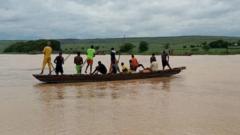British boarding schools are increasingly eyeing Nigeria’s vast market, with institutions like Charterhouse setting up campuses in Lagos. This move addresses the longstanding trend of affluent Nigerian families sending their children to prestigious schools in the UK, while also accommodating their cultural identities and financial concerns. Last year, Charterhouse launched a primary school in Nigeria and is poised to open a secondary school this September. Similarly, Rugby School will start offering secondary education this fall, while renowned establishments like Millfield, Wellington School, and Harrow are exploring their own opportunities in the nation.
For many Nigerian families, the international recognition and rigorous British curriculum present essential advantages. Karima Oyede, a British-Nigerian management consultant, expresses enthusiasm for her son’s transition from Rugby School UK to its Lagos campus, citing the dual benefit of receiving a British education within his homeland. Education experts suggest the preference among African parents hinges on granting their children a competitive edge globally, while also ensuring they retain their cultural roots—a balancing act complicated by prevailing socio-political dynamics in Nigeria.
Notably, the opening of British schools in Nigeria requires a careful adjustment to local cultural sensitivities, particularly surrounding LGBTQ issues due to Nigeria's strict laws. John Todd, the head of Charterhouse Nigeria, emphasizes the commitment to align with local legal standards while maintaining educational quality. This includes a provision permitting students to attend church on Sundays, showcasing a keen understanding of Nigeria’s religious fabric.
With rising costs associated with UK education, establishing these schools in Nigeria offers a more financially viable option for families while maintaining a high educational standard. Current exchange rates and increased VAT on private education in the UK have made the prospect of local British schooling even more attractive. For instance, annual fees at Charterhouse UK can reach about £60,000, while its Lagos campus offers a significantly lower fee of approximately £15,000.
Despite the increasing availability of private education in Nigeria, a stark educational divide persists, with many families unable to afford the higher fees associated with quality schools. The introduction of British schools may not radically transform Nigeria’s educational landscape but could represent heightened competition for established elite institutions.
Experts predict that the Nigerian market can handle this influx of schools without destabilizing existing ones, as a significant percentage of the population is under 14. Moreover, the UK’s education sector must be responsive to the changing dynamics, especially as competition from Nigerian campuses may affect enrollment in less prestigious schools back in the UK.
This potential shift also extends into higher education, where growing challenges in Nigeria’s own tertiary system might prompt British universities to consider expanding into the country as well. The strategic opening of schools is expected to facilitate a smoother educational path for Nigerian students, allowing them to mature within their cultural context before pursuing international opportunities if they choose.
For many families, including Oyede’s, the arrival of UK schools in Nigeria signals a promising turning point, intertwining local aspirations with global educational standards.
For many Nigerian families, the international recognition and rigorous British curriculum present essential advantages. Karima Oyede, a British-Nigerian management consultant, expresses enthusiasm for her son’s transition from Rugby School UK to its Lagos campus, citing the dual benefit of receiving a British education within his homeland. Education experts suggest the preference among African parents hinges on granting their children a competitive edge globally, while also ensuring they retain their cultural roots—a balancing act complicated by prevailing socio-political dynamics in Nigeria.
Notably, the opening of British schools in Nigeria requires a careful adjustment to local cultural sensitivities, particularly surrounding LGBTQ issues due to Nigeria's strict laws. John Todd, the head of Charterhouse Nigeria, emphasizes the commitment to align with local legal standards while maintaining educational quality. This includes a provision permitting students to attend church on Sundays, showcasing a keen understanding of Nigeria’s religious fabric.
With rising costs associated with UK education, establishing these schools in Nigeria offers a more financially viable option for families while maintaining a high educational standard. Current exchange rates and increased VAT on private education in the UK have made the prospect of local British schooling even more attractive. For instance, annual fees at Charterhouse UK can reach about £60,000, while its Lagos campus offers a significantly lower fee of approximately £15,000.
Despite the increasing availability of private education in Nigeria, a stark educational divide persists, with many families unable to afford the higher fees associated with quality schools. The introduction of British schools may not radically transform Nigeria’s educational landscape but could represent heightened competition for established elite institutions.
Experts predict that the Nigerian market can handle this influx of schools without destabilizing existing ones, as a significant percentage of the population is under 14. Moreover, the UK’s education sector must be responsive to the changing dynamics, especially as competition from Nigerian campuses may affect enrollment in less prestigious schools back in the UK.
This potential shift also extends into higher education, where growing challenges in Nigeria’s own tertiary system might prompt British universities to consider expanding into the country as well. The strategic opening of schools is expected to facilitate a smoother educational path for Nigerian students, allowing them to mature within their cultural context before pursuing international opportunities if they choose.
For many families, including Oyede’s, the arrival of UK schools in Nigeria signals a promising turning point, intertwining local aspirations with global educational standards.





















